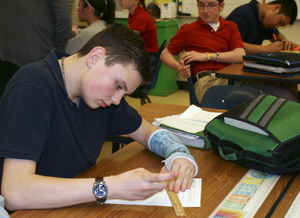By Anne Marie Amacher

By the fall of 2014, all public and accredited private schools in the state of Iowa will have begun implementing Iowa Core – also known as Common Core Standards.
The state adopted Common Core Standards in 2010 for language arts and math. These standards pertain to content for language arts and for mathematical practice for kindergarten through senior year in high school, said Lee Morrison, the Diocese of Davenport’s superintendent of Catholic schools.
Chuck Elbert, chief administrator of Holy Trinity Catholic School in Lee County, said most states have adopted Common Core Standards. “I believe the Core is well researched,” he added.
Julie Delaney, principal at St. Paul the Apostle Catholic School in Davenport, said the school has been phasing in the Core math curriculum since the summer of 2011. Teachers attended training workshops and have been working with Area Education Agency 9. Grades six through eight are in their second year of Core math curriculum, she added.
Core uses eight practice standards, which “make students critical thinkers,” Delaney continued. Teachers pose problems with specific learning goals. Students work individually and in groups to solve problems; teachers guide them toward understanding the content. Students then are asked to justify their solutions.
There are not as many concepts taught, Delaney said, but concepts are taught at a deeper level. The old way of teaching was memorization and algorithm. The new way is to reason your way to an answer. “There is more than one way to reach the same answer,” she noted.
Delaney sees students more engaged in class and in conversations about how they came up with an answer. Students use not only pencil and paper to solve problems, but also models, computers and other devices.
Parents have expressed a concern about less homework for math. Delaney said students spend more time on each new concept and work to master it before taking home story problems to work on.
As the new standards were being implemented at St. Paul’s, there were no books for the students. “Our teachers have been trained, they are working with the AEA and they have what they need for lessons,” Delaney explained.
New soft-cover books (described as “consumables”) will arrive in time for the next school year. “We will have consumables that the students can write in and take pages out.”
The cost for these materials works out to be about the same as purchasing a hard-cover textbook that is updated every seven to 10 years, she said. The next phase-in will involve language arts.
Sharon Roling, principal at St. Joseph Catholic School in DeWitt, said math teachers in grades three to eight began instruction in Core math last summer. “At the beginning of the school year, we decided that K-2 teachers should be included in the math work and we developed our professional development days around Iowa Core math.”
This summer, K-8 math teachers will take math classes through the AEA and “our professional development for the 2013-14 school year will again focus on math. We are very fortunate to have new math textbook adoption for all K-8 students for the 2013-14 school year.”
“Our teachers are learning about the new math practices and are sharing that information with students and parents. Teachers are spending countless hours creating lessons for the new standards and benchmarks since the present math textbooks do not support Iowa Core math. The teachers jokingly admit that ‘justify your answer’ is a practice that students are learning to hate because it requires them to think about the process, not just the answer.”
Roling said while some parents may have questions about Core math, they are very supportive of implementation.
Elbert said one big positive is that the curriculum is the same across the board. If a student transfers within a school district or into another district, the math and language arts programs are on the same level. One reservation about the program: it doesn’t transfer directly to college in the lecture hall. Credits do count, but colleges do not teach or use the Core curriculum.
How will this translate when students take the ACT in the future? Delaney and Elbert said the test will be changed to meet the new standards. The Iowa Test of Basic Skills was changed to the Iowa Assessment and is line with the Core, Elbert noted.
Common Core details
According to the Common Core Standards website: “The Common Core State Standards provide a consistent, clear understanding of what students are expected to learn, so teachers and parents know what they need to do to help them. The standards are designed to be robust and relevant to the real world, reflecting the knowledge and skills that our young people need for success in college and careers. With American students fully prepared for the future, our communities will be best positioned to compete successfully in the global economy.”
Forty-five states, the District of Columbia and four U.S. territories have adopted Common Core Standards. The only states and territory to have not adopted the standards are Alaska, Minnesota, Nebraska, Texas, Virginia and Puerto Rico.
Iowa uses Common Core Standards, which is called Iowa Core.







